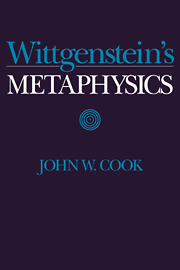Book contents
- Frontmatter
- Contents
- Preface
- List of Abbreviations
- Introduction
- Part I From Idealism to Pure Realism
- Part II The Metaphysics of Wittgenstein's Later Philosophy
- Part III Causation and Science in a Phenomenal World
- Part IV Logical Possibilities and the Possibility of Knowledge
- Part V The Past, Memory, and The Private Language Argument
- 16 Memory, Tenses, and the Past
- 17 Wittgenstein's Analysis of Mental States and Powers
- 18 Following A Rule
- 19 The Private Language Argument
- 20 Names of Sensations and the Use Theory of Meaning
- Name Index
- Subject Index
- Frontmatter
- Contents
- Preface
- List of Abbreviations
- Introduction
- Part I From Idealism to Pure Realism
- Part II The Metaphysics of Wittgenstein's Later Philosophy
- Part III Causation and Science in a Phenomenal World
- Part IV Logical Possibilities and the Possibility of Knowledge
- Part V The Past, Memory, and The Private Language Argument
- 16 Memory, Tenses, and the Past
- 17 Wittgenstein's Analysis of Mental States and Powers
- 18 Following A Rule
- 19 The Private Language Argument
- 20 Names of Sensations and the Use Theory of Meaning
- Name Index
- Subject Index
Summary
The two preceding chapters have provided the background needed for understanding Wittgenstein's change of mind about a basic tenet of the Tractatus theory of language. In his post-Tractatus years he came to realize that when the implications of his phenomenalism are carefully thought out, it becomes necessary to abandon what he had said about logically proper names (color words, for instance), namely, that such words are “correlated” with objects (TLP, 2.1514, 2.1515, 5.526) and “represent” them (TLP, 3.221, 4.0312). His abandonment of this view can be discerned in a 1932 conversation with Waismann, in which he said: “In the Tractatus logical analysis and ostensive definition were unclear to me. At that time I thought that there was ‘a connection between language and reality’” (WVC, pp. 209–210). In this chapter and the next we will see why he came to think that there cannot be such a connection.
To understand Wittgenstein's attack on his earlier view of the connection of names and objects, one must consider how such a connection might be established. Philosophers have often said that once one has correlated, say, a color and its name, one can continue using the name to denote that color. The idea is that we have within us an ability to continue applying the same name to the same color on successive occasions. One account of this ability is that offered by John Locke, and to understand what Wittgenstein says on this topic, it will be useful to review Locke's account.
- Type
- Chapter
- Information
- Wittgenstein's Metaphysics , pp. 286 - 315Publisher: Cambridge University PressPrint publication year: 1994



